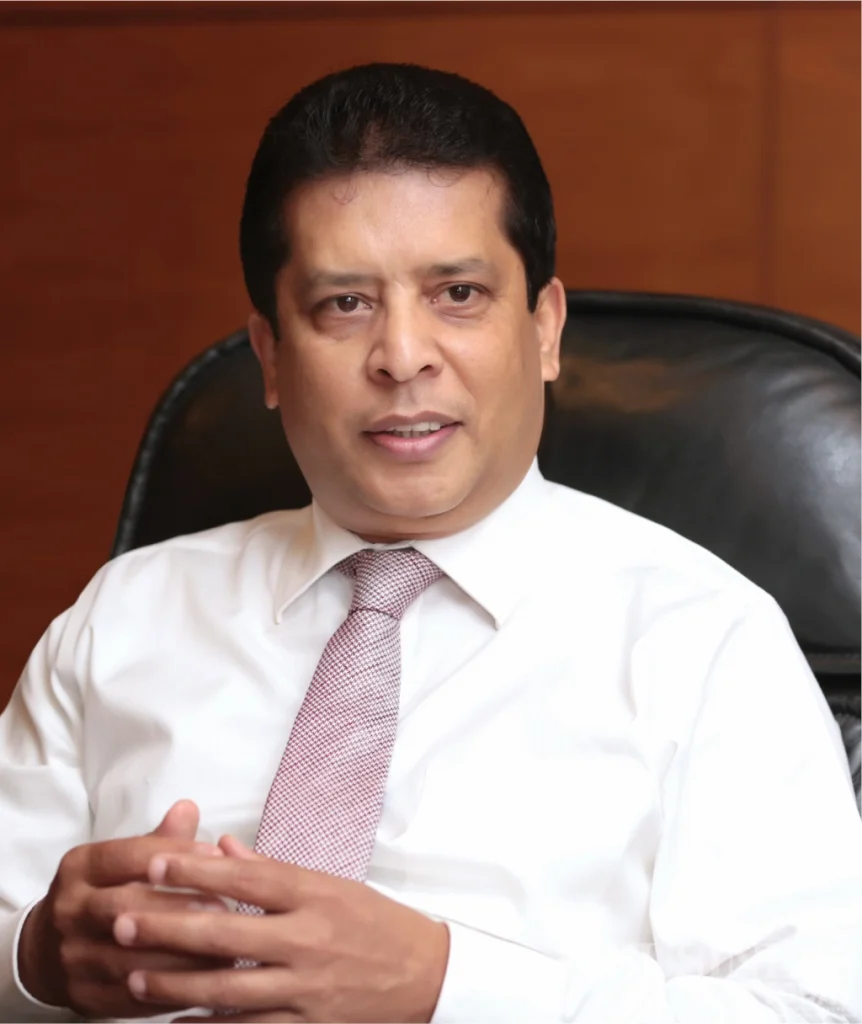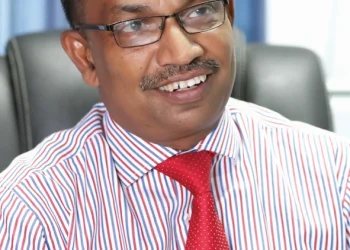
DFCC Bank has maintained steady growth over the years driven by innovation and digitisation. The country’s pioneering development bank and the first Sri Lankan bank to be listed on the Colombo Stock Exchange (then Colombo Broker’s Association), it has been a financer for many trailblazing initiatives over the decades. Today, DFCC Bank has transformed into a fully-fledged commercial bank providing comprehensive financial solutions under one roof for individuals and businesses across the country. Lakshman Silva took over the reigns in August 2017, becoming the first CEO to have emerged from within the Bank. As Sri Lanka transforms to an upper-middle income country, Lakshman Silva elaborates on the opportunities for the banking sector. Capitalising on their technological advantages, he says DFCC Bank’s vision is to forge ahead through the enhancement of their product and services portfolio while upholding the trust of their customers.
By Udeshi Amarasinghe and Keshini de Silva. Assisted by Venuri De Silva
Photography Menaka Aravinda
Could you elaborate on the performance of DFCC Bank during the past year?
We have performed quite well over the past year. Revenue increased by approximately 34 percent and profitability also showed significant growth taking the year of the merger as the base year.
In terms of key fundamentals, we have performed well in loan growth and profitability, while maintaining healthy interest margins. DFCC Bank’s Cost-to-Income ratio has consistently been the best in the industry as we strive to utilize innovative solutions to manage resources. For example; our internal operations are extensively digitised to minimise the use of paper and correspondence within the Bank is mostly electronic. Further, we take a lean approach to managing our operations and use the latest technologically advanced systems to enhance efficiency, which has created many advantages for us.
DFCC Bank also continues to enjoy medium to long term low cost credit lines which has further strengthened our financial performance.
DFCC Bank’s Cost-To-Income Ratio Has Consistently Been The Best In The Industry As We Strive To Utilize Innovative Solutions To Manage Resources.
We do have to improve our CASA base, and we have focused our efforts and resources for all staff to promote acquisition of new clients resulting in generation of low cost funding. Based on this, we have set an ambitious 2020 vision that drives all of us, and I expect positive results.
Having been appointed to the helm of DFCC Bank in the latter part of 2017, can you describe your plans and the progress so far?
There are a few things that I have set out to do. Firstly, to invest in developing our people. They are the most important asset of the Bank and to build a strong employer brand for the Bank going forward. DFCC Bank has a multi-disciplinary, highly skilled resource pool and I aim to ensure that we remain a hub for attracting industry talent.
Secondly, we will be focusing on driving acquisitions and increasing our client base. To do this, we will focus on cross-selling our retail services to existing project lending clients as well as devise innovative product offerings to attract new consumers across all segments.
Furthermore, embracing the digital revolution, we are focusing on disruptive innovation to bring the very latest financial products and services for the convenience of our customers.
I have to say that we have made significant progress that is enhancing our value proposition to our customers in terms of new and innovative product offerings and enhanced service delivery.
In fact, we have launched quite a few products and services in the recent past including the DFCC Virtual Wallet – Sri Lanka’s first digital wallet in the Banking Sector; Lanka Money Transfer – a cutting edge web-based remittance system; MTeller – a door step banking service, as well as Premier Go – the first interactive premier banking application.
More recently, we introduced a state-of-the-art Treasury system to enhance the efficiency of Treasury operations. Furthermore, we also launched DFCCiConnect, a cutting edge Payments Management Solution for businesses of all sizes.
DFCC Bank Credit Cards were also re-launched and the Bank became one of the first to offer Paywave technology across the full range of cards. Furthermore, DFCC Credit Cards offers one per cent CashBack on all customer transactions, which was a first time in the Sri Lankan market.
Therefore, this is an area that we will continue to focus on and we are further strengthened in Fintech, as we are able to collaborate with our Fintech subsidiary; Synapsys to bring new technology products to the market.
Finally, we are also looking at expanding our branch network across the country. We have been on an aggressive expansion drive and currently operate through 138 branches across the country and will continue to enhance our network to provide customers with accessibility and convenience.
Can you elaborate on how the DFCC Bank balances between commercial banking and development banking?
We have been providing commercial banking and development banking under one roof since 2003. We were and still are proud to say that we are the only financial institution in Sri Lanka who had the skill and professional knowledge in development banking while venturing into the commercial banking sphere. Currently, approximately 45-50 per cent of our portfolio is propped for development banking and approximately 50 per cent for commercial banking and we focus on providing end-to-end solutions for our customers.
As we increasingly move into the commercial banking space, we will continue to offer specialised project lending and long-term financing for up and coming new projects. As a leading financial institution, we are extremely proud of some of the projects that we have financed over the years, especially the green energy initiatives such as hydro-power, solar power, wind power and waste-to-energy projects. These are very important developments for the country at the moment, in which we have taken a lead role. Even considering other industry sectors in Sri Lanka, we have made pioneering efforts being the leading financier and we are happy to note that these relationships continue. Customers too are aware that the Bank has that capability, and they continue to place their trust in us. The Right of First Refusal is usually given to us in any new project and we take on board what we feel is beneficial for all stakeholders. Whilst we aggressively grow our commercial banking business, we will continue to embark on development banking projects.
We Were And Still Are Proud To Say That We Are The Only Financial Institution In Sri Lanka Who Had The Skill And Professional Knowledge In Development Banking While Venturing Into The Commercial Banking Sphere.
In terms of commercial banking we are in the process of re-deploying our resources and focusing our efforts on growing our CASA base. It is definitely a challenge and the results of this will be realised over time and it will not be immediate. In driving the commercial banking business we are focusing on innovation and collaborations to diversify our retail banking products and services. I believe we started at the correct time, when digitalisation was emerging in the banking sector. This means we can focus on alternate channels rather than investing purely on traditional brick and mortar delivery points.
What are your thoughts on the banking sector in general, in Sri Lanka?
Banking is an interesting and mostly stable sector in Sri Lanka. Many of the Sri Lankan banks seem stable at present due to the regulatory requirements and monitoring by the Central Bank of Sri Lanka. Currently, a capital augmentation plan has been introduced and specific capital requirements have been announced up to 2020. With the introduction of Basel III, this capital augmentation plan will help the banking sector to meet the regulatory requirements nationally and internationally.
When considering the new requirements and banking regulations introduced, I feel it will not be easy for the smaller banks to survive in the future. However, this is not limited to Sri Lanka; we have noticed that the trend prevails internationally as well. This has been one of the reasons why there has been a lot of discourse and discussion on the amalgamation and consolidation in the banking sector. When compared to the Sri Lankan population’s intensity; the number of financial institutions seem a little too much. Hence, financial consolidation seems the way forward. Despite the banking sector being strong, there have always been challenges in terms of revenue and profitability. The Banking sector is subject to direct and indirect taxes on profits and other income. In addition, the Banking sector acts as an agent for the Government, for tax revenue collections by participating in generating withholding tax from all the depositors. I believe this reduces the administrative cost of the Revenue Department.
Looking forward, the banking sector in Sri Lanka is going to face challenging times. Interest margins are shrinking due to compliance and other regulatory expenses, which will result in recording lower ROIs and ROEs. Furthermore, the Sri Lankan accounting practices are to be changed commencing this year with the implementation of IFRS 9 and accounting methodologies, and practices would see a major change which will have serious implications to the recorded profitability. Automation will be a mandatory requirement, which will ease the preparation of accounts as per the new accounting standards, which are acceptable to all the stakeholders.
The Most Important Factor Is The Trust And Confidence Clients Have Placed In DFCC Bank. We Have Clients Who Have Been With Us And Have Grown With Us From Small Scale To The Large Scale.
Over the years we have noticed difficulties in attracting and retaining young staff in this sector due to the attractive offerings made by other sectors in the economy. We see significant change in that trend at the moment.
Can you tell us about yourself, about your career and background?
I have been with DFCC bank for 31 years and I am currently the Bank’s longest serving employee. After my graduation and once I acquired professional accounting qualifications, I joined the Department of Inland Revenue as an assessor. After working for around four years, I realised that it was not the job I wanted to do. I joined the DFCC Bank in 1987 and have had the fortune of working in almost all divisions from MSME (Micro, Small and Medium Enterprises) to leasing, branch banking and corporate banking. In addition to that, I was given the challenge and opportunity to join DFCC Vardhana Bank, when the commercial bank was formed. I was initially appointed COO and then as its CEO. I was engaged with DFCC Vardhana Bank operations for over 12 years and I consider that period to be the most enjoyable time in my life. The experience was similar to starting your own venture and making sure that it grows. I had the opportunity of recruiting and working with new staff and competing with established banks in the country despite having a small base of Assets and Liabilities. All the staff within the Group who worked tirelessly towards the success of DFCC Vardhana Bank did a marvellous job in converting the Bank into a formidable one. I believe it is the real match of development and commercial banking that paved the way to the success we enjoy today. We also had the opportunity of transforming some of the traditional development bankers to become effective commercial bankers, which provided us with an added advantage.
I was appointed CEO in August 2017 and was the first CEO to have come from within the organisation. Most of my predecessors joined from outside to lead the Bank. I believe my appointment will spur many others in the Bank to follow my footsteps in the future to lead this Bank to the next level of growth.
Future plans?
We have a group of dynamic professionals at the Bank, and this is a fact I reiterate at many of the events. If you compare with other financial entities, the average age of our staff is around 30-40 years. There are a large number of youngsters and they are very enthusiastic. They believe in the organisation and we have created an operational culture that is unique. In comparison to others in the sector, we have a higher employee retention rate. I believe one of the key successes of the Bank is our staff. We also have a professional Board of Directors headed by a Chairman who has a keen interest in the growth of the organisation. They invest a lot of time in guiding, advising, providing direction and encouraging our staff.
The most important factor is the trust and confidence clients have placed in DFCC Bank. We have clients who have been with us and have grown with us from small scale to the large scale. They would have started as SME clients and now are some of the biggest players in their respective industries in Sri Lanka. We are happiest when we see our own clients doing well and becoming leading players in their respective sectors.
DFCC is also a part of a synergized DFCC Group that differentiates us from the rest of the pack.
Leveraging on these strengths we will be focusing on creating new and innovative products and diversifying our portfolio, looking at potent growth opportunities both nationally and internationally. We will also look at digitising internal and external processes to achieve efficiency and long term growth.





